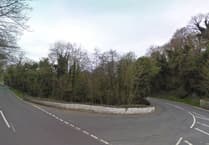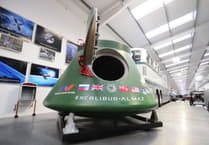Remembrance Sunday will be poignant and thought-provoking commemoration of the men and women who lost their lives in the First World War and the conflicts that have followed it.
It should also be a reminder of the animals that have filled a variety of roles in warfare, from carrying men and munitions, evacuating the wounded, performing guard duties, carrying out search and rescue operations, detecting gas in trenches, and locating unexploded bombs.
The presence of red poppies on the, otherwise desolate, Flanders Field battle ground led to them becoming associated with Remembrance Sunday, and since 2016 the purple poppy has been used to commemorate animal victims of war.
The greatest number of animal casualties in warfare have been horses, ponies, donkeys and mules.
They would carry heavy guns, ammunition and vital supplies to and from the battle grounds, overcoming rough terrain that was impassable for motorised vehicles.
They would also transport wounded soldiers to field stations and hospitals, and, of course, they carried cavalry soldiers.
It is estimated that a staggering eight million horses and countless ponies, donkeys and mules died in the First World War, not only from the horrors of shellfire but also due to appalling conditions, often suffering agonising deaths from wounds, starvation, thirst, exhaustion, disease and exposure.
The Manx SPCA’s archives show that it sent money to The Blue Cross Fund, which was founded in the same year as the society (1897) and which raised many thousands of pounds to help equines in the First World War.
More than 50,000 horses were treated in Blue Cross hospitals in France and the charity sent vital veterinary supplies to 3,500 units of the British Army.
Most animals used in contemporary military service are working dogs - they were deployed, for example, to locate improvised explosive devices (IEDs) in Iraq and Afghanistan.
Historically, dogs would carry water and medical supplies to men on the front line, and they would locate wounded soldiers and lead stretcher parties to them.
Given dogs were able to navigate battlefields more quickly and easily than humans, they were also trained to carry messages. This task was especially important when technology failed or when other forms of communication were cut off.
The beautiful Weimaraner cross husky, Bella, would not cope with life as a working dog, on or off the battlefield, because she’s not very confident in new situations or with people she doesn’t know, and she tries to hide when she hears loud noises.
Bella is only two years old, though, and so she has only just finished being a puppy.
With sympathetic and patient new owners, and a quiet home environment, her self-confidence will grow as she matures and she will learn to take new experiences in her stride.
For all that Bella is shy around new people, the same can’t be said for her approach to other dogs - she simply loves them, whether they’re large or small, old or young.
She will play happily for as long as she can, and usually has more energy and staying power than her canine companions.
She’s full of bounce and energy, and so her new owners will need to give her lots of exercise. They will also need to have a well-fenced garden because Bella is an accomplished escape artist.
If you’re interested in meeting Bella please contact the kennels team on 851672, option one, and complete a home finder form which can be found on the adoption pages of the Manx SPCA’s website (www.manxspca.com).

.jpeg?width=209&height=140&crop=209:145,smart&quality=75)


